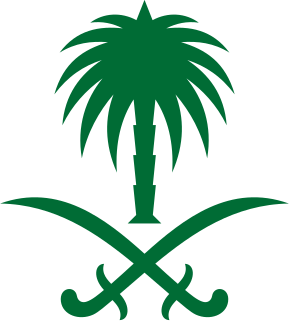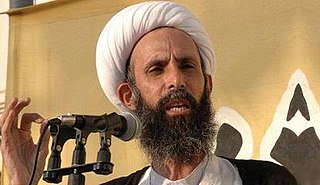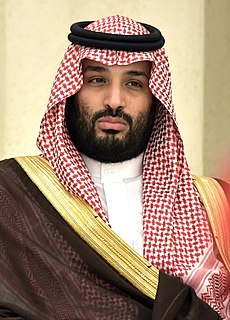Related Research Articles

The history of Saudi Arabia as a nation state began with the emergence of the Al Saud dynasty in central Arabia in 1727 and the subsequent establishment of the Emirate of Diriyah. Pre-Islamic Arabia, the territory that constitutes modern Saudi Arabia, was the site of several ancient cultures and civilizations; the prehistory of Saudi Arabia shows some of the earliest traces of human activity in the world.

The Saudi Arabian Armed Forces(SAAF) & also known as the Royal Saudi Armed Forces, are the military forces of the Kingdom of Saudi Arabia. It consists of the Saudi Arabian Land Forces, the Royal Saudi Navy, the Royal Saudi Air Force, the Royal Saudi Air Defense, and the Royal Saudi Strategic Missile Force. The King of Saudi Arabia is the commander-in-chief of the armed forces and forms military policy with the Ministry of Defense and the Ministry of Interior. The five Armed Forces are among eight military forces of Saudi Arabia, with the others including the Saudi Arabian National Guard, the Saudi Royal Guard Regiment and Saudi Arabian Border Guards.

The Arabian Peninsula, or Arabia, is a peninsula of Western Asia, situated northeast of Africa on the Arabian Plate. At 3,237,500 km2 (1,250,000 sq mi), the Arabian Peninsula is the largest peninsula in the world.

Saudi Arabia, officially the Kingdom of Saudi Arabia (KSA), is a country on the Arabian Peninsula in Western Asia. It has a land area of about 2,150,000 km2 (830,000 sq mi), making it the fifth-largest country in Asia, the second-largest in the Arab world, and the largest in Western Asia. It is bordered by the Red Sea to the west; Jordan, Iraq, and Kuwait to the north; the Persian Gulf, Qatar and the United Arab Emirates to the east; Oman to the southeast; and Yemen to the south. Bahrain is an island country off the east coast. The Gulf of Aqaba in the northwest separates Saudi Arabia from Egypt. Saudi Arabia is the only country with a coastline along both the Red Sea and the Persian Gulf, and most of its terrain consists of arid desert, lowland, steppe, and mountains. Its capital and largest city is Riyadh. The country is home to Mecca and Medina, the two holiest cities in Islam.

The House of Saud is the ruling royal family of Saudi Arabia. It is composed of the descendants of Muhammad bin Saud, founder of the Emirate of Diriyah, known as the First Saudi state (1727–1818), and his brothers, though the ruling faction of the family is primarily led by the descendants of Abdulaziz bin Abdul Rahman, the modern founder of Saudi Arabia. The most influential position of the royal family is the King of Saudi Arabia, an absolute monarch. The family in total is estimated to comprise some 15,000 members; however, the majority of power, influence and wealth is possessed by a group of about 2,000 of them. Some estimates of the royal family's wealth measure their net worth at $1.4 trillion. This figure includes the market capitalization of Saudi Aramco, the state oil and gas company, and its vast assets in fossil fuel reserves.

Human rights in Saudi Arabia are a topic of concern and controversy. The Saudi government, which mandates both Muslim and non-Muslim observance of Islamic law under the absolute rule of the House of Saud, has been accused of and denounced by various international organizations and governments for violating human rights within the country. The authoritarian regime ruling the Kingdom of Saudi Arabia is consistently ranked among the "worst of the worst" in Freedom House's annual survey of political and civil rights. On 28 December 2020, the Criminal Court in Riyadh sentenced a prominent Saudi women's rights activist to nearly 2 years in prison, drawing renewed attention to the kingdom's human rights abuses.

The Saudi Arabia national football team represents Saudi Arabia in men's international football, and the team's colours are green and white. Saudi Arabia are known as Al-Suqour and Al-Akhdhar ; the team represents both FIFA and Asian Football Confederation (AFC).
Terrorism in Saudi Arabia has mainly been attributed to Islamic extremists. Their targets included foreign civilians—Westerners affiliated with its oil-based economy—as well as Saudi Arabian civilians and security forces. Anti-Western attacks have occurred in Saudi Arabia dating back to 1995. Saudi Arabia itself has been accused of funding terrorism in other countries, including Syria.

Salman bin Abdulaziz Al Saud is King of Saudi Arabia, reigning since 23 January 2015. Prior to his accession, he was Crown Prince of Saudi Arabia from 16 June 2012 to 23 January 2015. He is the 25th son of King Abdulaziz and the sixth of his sons who have reigned as kings.

Yasser Saeed Al-Qahtani is a former Saudi footballer who played as a forward for Al-Hilal FC in the Saudi Professional League. He was also captain of the Saudi Arabia national team. Yasser is widely recognized as one of the greatest Saudi footballers of the 21st century.

The Saudi Arabian Football Federation is the football governing body of Saudi Arabia. Founded in 1956, its responsibilities include administration of club competitions and national teams. The founder of the Saudi Arabian Football Federation is Prince Abdullah bin Faisal Al-Saud

Royal Saudi Land Forces is the land warfare service branch of the Armed Forces of Saudi Arabia. It is part of the Ministry of Defense, which is one of the two military departments of the Government of Saudi Arabia, together with the Ministry of National Guard.
Capital punishment is a legal penalty in Saudi Arabia. Death sentences are almost exclusively based on the system of judicial sentencing discretion (tazir), following the classical principle of avoiding Sharia-prescribed (hudud) penalties when possible. In recent decades, the government and the courts have increasingly issued these sentences, reacting to a rise in violent crime during the 1970s. This paralleled similar developments in the U.S. and Mainland China in the late 20th century.

Abdullah bin Abdulaziz Al Saud was King of Saudi Arabia from 1 August 2005 until his death in 2015. Prior to his ascension, he was Crown Prince of Saudi Arabia since 13 June 1982. He was the tenth son of King Abdulaziz, the founder of Saudi Arabia, and the fifth of Abdulaziz's six sons who were kings.

The Hajj is an annual Islamic pilgrimage to Mecca, Saudi Arabia, the holiest city for Muslims. Hajj is a mandatory religious duty for Muslims that must be carried out at least once in their lifetime by all adult Muslims who are physically and financially capable of undertaking the journey, and of supporting their family during their absence from home.

Ayatollah Sheikh Nimr Baqir al-Nimr, commonly referred to as Sheikh Nimr, was a Shia sheikh in al-Awamiyah in Saudi Arabia's Eastern Province whose arrest and execution was widely condemned, including by governments and human rights organizations.

Mohammed bin Salman Al Saud, colloquially known as MBS, is a Saudi Arabian politician who is the crown prince, deputy prime minister, and minister of defense of Saudi Arabia. He also serves as the chairman of the Council of Economic and Development Affairs and chairman of the Council of Political and Security Affairs. He is the seventh son of King Salman bin Abdulaziz and the eldest of six sons born to King Salman's third wife, Fahda bint Falah Al Hithlain. Mohammed bin Salman controls his father's government and is considered the de facto ruler of Saudi Arabia. In June 2017, King Salman removed his nephew Muhammad bin Nayef from the position of crown prince and appointed Mohammed bin Salman in his place.

The Yemeni Civil War is an ongoing multilateral civil war that began in late 2014 mainly between the Abdrabbuh Mansur Hadi-led Yemeni government and the Houthi armed movement, along with their supporters and allies. Both claim to constitute the official government of Yemen.

On 26 March 2015, Saudi Arabia, leading a coalition of nine countries from West Asia and North Africa, launched an intervention in the Yemeni Civil War in response to calls from the president of Yemen Abdrabbuh Mansur Hadi for military support after he was ousted by the Houthi movement. The conflict ignited between the government forces, the Houthi rebels and other armed groups after the draft constitution and power-sharing arrangements collapsed, despite progress in the political transition led by the United Nations at that time, leading to an escalation of violence in mid-2014. The Houthis and allied units of the armed forces seized control of Sana’a and other parts of the country in September 2014 and in the following months. This prompted President Hadi to ask Saudi Arabia to intervene against the Iranian-backed Houthis.
The Qatif and Dammam mosque bombings occurred on 22 and 29 May 2015. On Friday May 22, a suicide bomber attacked the Shia "Imam Ali ibn Abi Talib Mosque" situated in Qudeih village of Qatif city in Eastern Province, Saudi Arabia. The Islamic State of Iraq and Syria claimed responsibility for the blast, which killed at least 21 people. The event is the second deadly attack against Shia in six months.
References
- ↑ "2015 World Championship Roster" (PDF). IHF . Retrieved 15 January 2015.
